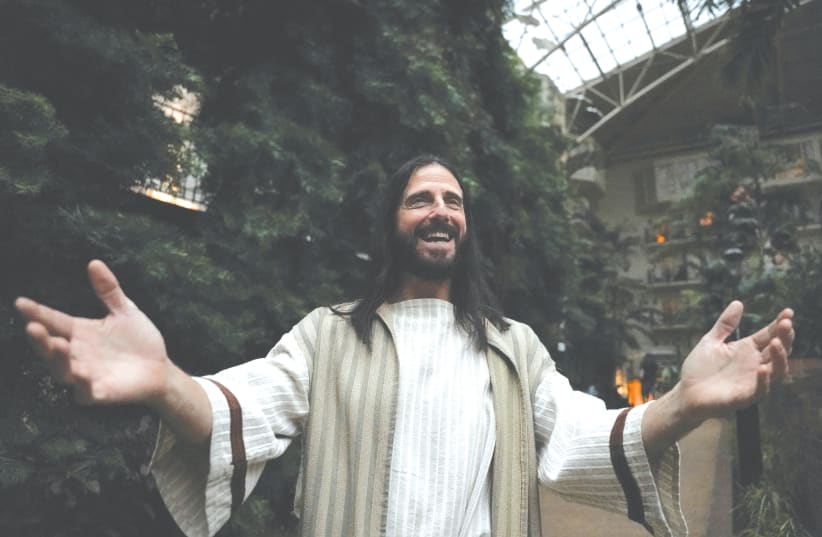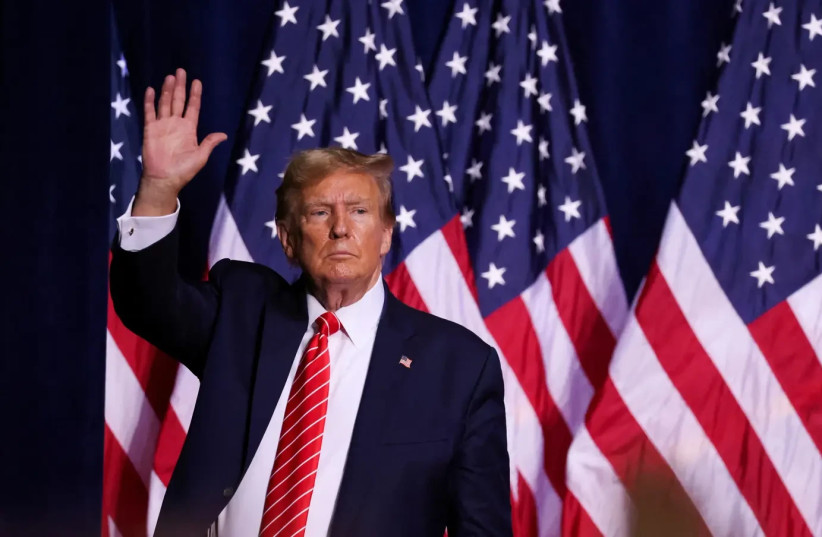Donald Trump likes to go onstage for his rallies to the music of Lee Greenwood’s “God Bless the USA.” A more fitting tune might be “Onward Christian Soldiers” for the candidate who has declared November 5 will be Christian Recognition Day. “We have to bring Christianity back into our lives,” he preaches to the faithful.
Election Day 2024 will be “the most important day in the history of our country,” he said, pronouncing it “Christian Visibility Day.” (He uses both labels.) That is when Christians are “going to vote like never before,” presumably for him. As a Jew I can’t help wondering whether that will be followed by a night of broken glass.
It sounds very much like he wants his minions to come out in force, literally, especially when he cites Psalm 109, which includes “calls for violence and revenge,” observed Robert P. Jones, founder of the nonpartisan Public Religion Research Institute (PRRI).
Paired with his attacks on the loyalty of American Jewry, Bill Barrow of the Associated Press sees this as part of the disgraced former president’s strategy to “frame this year’s election as a referendum on the strength of Christianity in the US.”
This will be the second coming of Saint Donald, a man who by his own admission has never done anything wrong, calling himself “perhaps the most honest guy almost in the world.” Even the pope has the need to confess his sins, but apparently not the infallible who enters the courts declaring “I did nothing wrong.” And he’s not referring simply to the 34 federal criminal charges he is currently on trial for in New York.
He is framing a second term as a holy crusade to defend Christianity against an assault by leftists who want “to tear down crosses.” He told the National Religious Broadcasters convention, “But no one will be touching the cross of Christ under the Trump administration, I swear to you.” Comparing himself to Jesus, he added, “I’m taking the bullets [and] the arrows for you.”
He wants to shred the First Amendment, starting with freedom of the press (“enemies of the people”), freedom of assembly (shoot protesters), and the wall of separation between religion and state – historically, a critical protection for religious minorities, including Jews.
His latest grift was pitching a $59.99 White Christian Nationalist God Bless the USA Bible during Holy Week just before Easter. It’s the King James Version of “my favorite book” for his fundamentalist followers. Of course, Trump pockets a commission on each Bible sold.
Joe Biden addresses the subject
Joe Biden couldn’t resist bringing that up at the recent White House Correspondents’ dinner (an event the thin-skinned Trump boycotted four straight years). “Trump’s so desperate, he started reading those Bibles he’s selling,” the president said. “Then he got to the First Commandment: ‘You shall have no other gods before me.’ That’s when he put it down and said, ‘This book’s not for me.’”
Trump’s rhetoric is about much more than his cynical embrace of religion. Director Rob Reiner, who just released a documentary on the subject, said the rise of Christian nationalism is “a political movement, really, certainly not a spiritual or religious movement.”
It is steeped in the great replacement theory, the racist conspiracy that white Americans and Europeans are being replaced by non-white, not-their-kind-of-Christians and other immigrants. Remember the neo-Nazi marchers in Charlottesville chanting “Jews will not replace us?” Trump prefers immigrants from “nice countries” like Switzerland, Denmark, and Germany (home of his grandparents), not third world “s***holes.” No mention of the Czech Republic or Slovenia, homes of his first and third wives.
Trump insists “I don’t have a racist bone in my body!” Jonathan Martin in Politico disagrees; he called the former president a “race-baiting demagogue.”
Trump has said he wants to establish a “federal task force to combat” “antiwhite racism” and “anti-Christian bias.”
A new Pew survey shows two-thirds of white Evangelical Protestants say they have a favorable view of Trump, as do half of white Catholics and non-Evangelical Protestants. At the opposite end of the scale are atheists with an 88% unfavorable opinion, 80% of black Protestants and 79% of Jews.
IT IS puzzling that so many who describe themselves as Christian support a man who was divorced twice, married three times, is an admitted philanderer, was labeled a rapist by a court, was accused of covering up an affair with a porn star, bragged about grabbing women by the genitals, and was found liable for sexual abuse.
“Most people who view Trump positively don’t think he is especially religious himself. But many think he stands up for people with religious beliefs like theirs,” Pew found. Only 8% of those holding a positive view of Trump actually think he is very religious. He recently changed his religious affiliation from Presbyterian to “nondenominational Christian,” he told Religion News Service.
He’s never been known to be a regular churchgoer or as having strong religious beliefs. A poll by the nonpartisan PRRI showed 40% feel he “is mostly using religion for political purposes.” Two Presbyterian Church leaders who met with him early in his first term told CNN that he didn’t seem to understand the difference between mainline Protestants and Evangelicals.
Antisemitic subtext
Antisemitism is a recurrent subtext for Trump. It is found in his social media postings, speeches, campaign memes and tropes, the company he keeps, ugly stereotypes about Jews and money, and even in his Rosh Hashanah message last year when he accused “liberal Jews” of voting to “destroy” the United States and Israel. Any Jew who votes for a Democrat or Biden “should have their head examined,” he has said.
Lately, he has accused Biden of being an antisemite and having “totally abandoned Israel,” apparently because of his response to the Gaza war.
To those who defend him by pointing out that two of his grandchildren and their parents, as well as many of his employees, are Jews, I’d refer them to historian Bryan Mark Rigg, who pointed out that a number of top Nazis, including Joseph Goebbels and Hermann Goring, had Jewish spouses or ancestry, likely even Adolf Hitler and Eva Braun.
To win Evangelical support eight years ago Trump, who had been a pro-choice Democrat a few years earlier, went gung-ho against abortion and pledged to appoint judges who would overturn Roe v. Wade. He did it and they did, and he’s bragging about it.
But lately he’s been having second thoughts, as it becomes apparent that decision was very unpopular, even among many Republican voters. Restoring abortion rights is proving a popular message for Democrats, and Trump is looking for a way to sound moderate without offending his stridently anti-abortion Evangelical base with its absolutist demands. They’re even talking about banning contraceptives and in-vitro fertilization.
The demands of the religious Right go beyond reproductive rights to include banning books, prohibiting teaching about race, blocking same-sex marriage, and curtailing LGBT rights, school vouchers, and diversity, equity, and inclusion. Trump could afford to be doctrinaire while appealing to his base during the primaries, but he needs the moderate swing voters who will decide the election in November.
Will he be able to win their votes with his promises on “Christian Visibility Day,” November 5, with his religious crusade, $59.99 Bible, and vow to protect “the cross of Christ?”
The writer is a Washington-based journalist, consultant, lobbyist, and former American Israel Public Affairs Committee legislative director.

